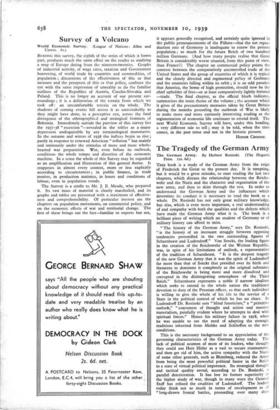Survey of a Volcano
READING this survey, the eighth of the series of which it forms part, produces much the same effect on the reader as studying a map of Europe dating from the nineteen-twenties. Graphs of industrial activity, of wage rates, taxation and Government borrowing, of world trade by countries and commodities, of population ; discussions of the effectiveness of this or that measure and the prospects of this or that policy, confront the eye with the same impression of unreality as do the familiar outlines of the Republics of Austria, Czecho-Slovakia and Poland. This is no longer an account of our present sur- roundings ; it is a delineation of the terrain from which we took off : an uncomfortable terrain on the whole. The shadows of coming events fell across it as unmistakably as they might have done, to a perceptive eye, across the fatal divergence of the ethnographical and strategical frontiers of Bohemia. Immediately outside the purview of this survey lies the 1937-38 " recession "—revealed in the tables as a major depression undisguisable by any terminological manoeuvre. In the autumn and winter of 1938 the indices begin to rise ; partly in response to renewed American " reflation " but mainly and ominously under the stimulus of more and more whole- hearted war preparation. War, even before its outbreak, conditions the whole tempo and direction of the economic machine. In a sense the whole of this Survey may be regarded as an amplification and illustration of this general theme. It reappears in almost every context, more or less explicitly according to circumstances ; in public finance, in trade treaties, in production statistics, in hours and conditions of labour, even in population trends.
The Survey is a credit to Mr. J. E. Meade, who prepared it. Its vast mass of material is clearly marshalled, and its graphs and tables are presented with a maximum of effective- ness and comprehensibility. Of particular interest are the chapters on population movements, on commercial policy, and on the economic effects of war and territorial change. The first of these brings out the fact—familiar to experts but not, it appears generally recognised, and certainly quite ignored in the public pronouncements of the Fiihrer—that the net repro- duction rate of Germany is inadequate to renew' the present population ; so much for the future Reich of two hundred million Germans. (And how many people realise that Great Britain is considerably worse situated, from this point of view, than France?) The chapter on commercial policy points the contrast between the comparatively uncontrolled trade of the United States and the group of countries of which it is typical and the closely directed and regimented policy of Geimany and the countries falling within its orbit ; it is an odd paradox that America, the home of high protection, should now be the chief upholder of free—or at least comparatively lightly fettered —trade. The final chapter, as the official blurb indicates, summarises the main theme of the volume ; the account which it gives of the precautionary measures taken by Great Britain during the months preceding the outbreak of War is likely to make more and more curiously interesting reading as the regimentation of economic life continues to extend itself. The next World Economic Survey will have, under this heading, a very different tale to tell ; may it be told, when the time comes, in the past tense and not in the historic present.
HONOR CROOME.




































 Previous page
Previous page